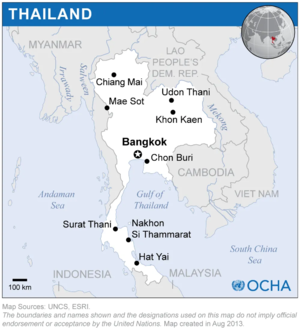DFM Thailand
Thailand is located in Southeast Asia bordering the Andaman Sea in the West and the Gulf of Thailand in the East. The country is divided into 76 provinces with about 514,000-km² total land area, total length of 2,624 km continental coastline, 394,000 km² shelf area, and a total water area of 319,750 km2. Thailand has 25 river basins with 254 sub-basins, and the two principal river systems are the Chao Phraya River and the Mekong River (FAO 2018).
Fish is the primary source of animal protein for most of Thailand’s population, particularly those in the coastal provinces. There are over 650,000 people employed in fish farms and related industries (400,000 in freshwater aquaculture, 78,000 in brackish water aquaculture, and 184,000 in processing plants). About one-third of those employed in the aquaculture sub-sector are women, particularly in activities related to feed preparation, feeding, harvesting, processing, accounting, and marketing (http://www.seafdec.org/fisheries-country-profile-thailand/).
Dried Fish in Thailand
Thai people enjoy dried fish in a wide range of forms and varieties. As fish is a staple in Thai people’s diet, it is common to see people with the most basic fishing gear (often without any boat), fishing at any water body. Some of these fish are consumed fresh, but many are sun-dried or fermented at home, for future consumption.
The well-developed infrastructure in the country means that dried fish can be transported for selling at the smallest villages in the most remote places. A large number of fish species and dried fish products are part of the fish trades that take place in all 72 inland and coastal provinces.
While the diversity of dried fish products that are traded in markets may not be unique to Thailand, there are numerous ‘informal’ markets and trades that take place throughout the country, like in small villages in remote part of the country.
The DFM Thailand Team
- Ratana Chuenpagdee
- Kungwan Juntarashote
- Suvaluck Satumanatpan
- Thamasak Yeemin
- Mr. Suntorn Kumsuk
- Ms. Rassikan Chiradetprapai
- Ms. Suthasinee Sontirat
- Ms. Thitima Eiadkaew
- Ms. Noppawan Muanmee
- Kyoko Kusakabe
Partner Organisations
Asian Institute of Technology, Thailand
The Asian Institute of Technology (AIT), which was established in 1959, is an international institute of higher learning. It is one of the Asia’s pioneer institutions contributing towards meeting the region’s growing needs for advanced learning in engineering, science, technology and management, research and capacity building. With a mission of producing highly qualified and committed professionals who will play a leading role in the sustainable development of the region and its integration into the global economy, AIT works both on natural science and social science disciplines and treasures an interdisciplinary approach. AIT is based on Thailand and has affiliated centers in other parts of the world.
Department of Fisheries (DoF), Thailand
The Thailand Department of Fisheries (DoF) is the main government agency responsible for the management and governance of capture and aquaculture fisheries inside and outside the Thai territorial waters. Established in 1957, DoF operates under the Ministry of Agriculture and Cooperatives and is organized into 26 divisions, covering all aspects of fisheries from development policies and strategies, monitoring, control and surveillance, fisheries resource management, fishing vessels and fishing operation management, and fish inspection and quality control. The DoF has a Fisheries Provincial Office in all provinces of Thailand, as well as four research and development centres, focusing on capture and culture in marine and inland systems.
Marine Biodiversity Research Group (MBRG): Ramkhamhaeng University (RU), Thailand
Marine Biodiversity Research Group (MBRG) is one of the academic institutes in Ramkhamhaeng University (RU) in Bangkok, Thailand. The MBRG-RU was established in 1995 to carry out a project on coastal ecosystems in the Gulf of Thailand, with support from the Thailand Research Fund (TRF). Since then, it has continued to conduct many projects on coastal, fisheries and marine ecosystems, and now plays a key role in providing scientific advice to various government departments. Recently, MBRG has extended the focus from marine biodiversity and coral reef conservation to focus on marine and fisheries governance, ecosystem services, and small-scale fisheries livelihoods. The institute also collaborates with various national and international academic institutes as well as working closely with local communities in many coastal areas to build research cooperation on coastal and marine conservation and management.
Significant Publications on Dried fish-Thailand
Rattagool, P., Methatip, P., Esser, J. R., Hanson, S. W., & Knowles, M. J. (1990). Evaluation of insecticides to protect salted dried marine fish from insect infestation during processing and storage in Thailand. FAO Fisheries Report, 401(Suppl.), 189-204.
Kuo, T. C., Laksanawimol, P., Aylesworth, L., Foster, S. J., & Vincent, A. C. J. (2018). Changes in the trade of bycatch species corresponding to CITES regulations: the case of dried seahorse trade in Thailand. Biodiversity and conservation, 27(13), 3447-3468.
